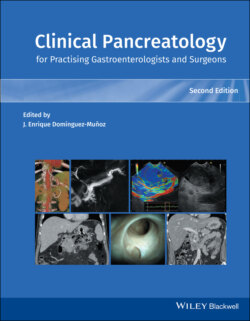Читать книгу Clinical Pancreatology for Practising Gastroenterologists and Surgeons - Группа авторов - Страница 72
Obesity and Hypertriglyceridemia
ОглавлениеObesity has long been recognized to be a risk factor for pancreatic necrosis, organ failure, and mortality but its precise mediatory mechanism remained elusive until recently [66,67]. The differential significance of visceral, intrapancreatic and peripancreatic distribution of fat has been illustrated in multiple studies [68,69]. Lipolysis of triglycerides contained within and around the pancreatic parenchymal adipose tissue releases unsaturated free fatty acids that mediate end‐organ injury by causing mitochondrial failure [67,69,70]. Body mass index (BMI) has been incorporated into existing prediction systems such as APACHE‐II scores, with modest performance improvement [71]. Free fatty acids also bind to calcium, which explains the decreased calcium level often seen during severe necrotizing pancreatitis, and calcium level is part of existing scoring systems such as Ranson’s. Similar mechanisms likely explain why hypertriglyceridemic patients are at increased risk of developing severe pancreatitis [72].
Table 4.2 Cytokines, chemokines, and adipokines examined in studies for prediction of severe pancreatitis or mortality.
| Name of cytokine, chemokine or adipokine | Function | AUC for severe pancreatitis or mortality |
|---|---|---|
| Interleukin‐1β | Proinflammatory cytokine: stimulates macrophages, causes lymphocyte maturation; induces acute‐phase protein production; facilitates leukocyte trafficking | 74–82% [55] |
| Interleukin‐6 | Proinflammatory cytokine: regulates T lymphocytes activation and differentiation, causes lymphocyte maturation; induces acute‐phase protein production; facilitates neutrophil trafficking to the site of injury; strongly associated with acute lung injury in acute pancreatitis | 75–88% [55–57] |
| Interleukin‐8 | Proinflammatory cytokine | 73–76% [55,57] |
| TNF‐α | Proinflammatory cytokine: induces acute‐phase protein production; activates neutrophils and macrophages | 81% [58] |
| Angiopoietin‐2 | Autocrine peptide regulator of vascular permeability | 74–81% [46,59] |
| Resistin | Adipokine: induces production of IL‐1β, IL‐6 and TNF‐α | 76–80% [60,61] |
| Visfatin | Adipokine: induces production of IL‐1β, IL‐6 and TNF‐α | 74% [62,63] |
| Monocyte chemotactic protein‐1 | Chemokine secreted early in the disease course to recruit monocytes, lymphocytes, mast cells, and eosinophils | 88% [64] |
